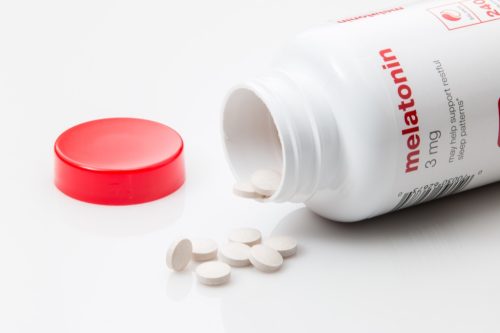The Centers for Disease Control and Prevention (CDC) estimates that roughly 59 percent of American adults have taken a dietary supplement within the past 30 days. For many, the over-the-counter capsules can be a seemingly harmless way to do everything from boost their immune system to help promote longevity. But just like any medication, taking a supplement can come with side effects—including causing nightmares. Read on to see which daily dose could be terrorizing your dreams.
RELATED: Doctors Reveal 5 Supplements They Recommend Most for Better Sleep.
High doses of melatonin could be causing your nightmares.
When trying to secure a good night’s sleep, many people turn to melatonin supplements, especially if they want to avoid prescription sleep aids. But according to doctors, one of the potential side effects of the bedtime dosage could be causing a different kind of disturbance while you snooze.
“If you go into your local drugstore, most melatonin products are five to 10 milligrams,” Whitney Roban, PhD, a clinical psychologist and sleep specialist, tells Inverse. “Anything over five milligrams has been shown to increase the likelihood of negative side effects like nausea, increased anxiety, and headaches. The side effects I hear about the most are very vivid dreams and nightmares.”
Why is this? Melatonin is a naturally occurring “sleep hormone” found in the body that regulates the cycles during the day when we feel tired or alert. Therefore, some doctors hypothesize that melatonin could cause people to fall into a deeper sleep—with some previous studies even finding that it can increase the amount of time in the REM stage where people are most likely to have nightmares.
“If you are spending more time in the stage of sleep where vivid dreams are most likely to occur, this may naturally lead to increases in bad/vivid dreams,” Michelle Drerup, PhD, a behavioral sleep medicine psychologist, tells Cleveland Clinic.
She explains that melatonin also releases a protein known as vasotocin that helps regulate REM sleep during the night. So, taking higher amounts of melatonin can increase vasotocin levels.
RELATED: 9 Melatonin Side Effects to Watch Out For, Doctors Say.
Studies have found that many melatonin supplements contain different dosages than advertised.


In a 2017 study published in the Journal of Clinical Sleep Medicine, researchers found that the melatonin dosage in supplements varied wildly from what was listed on the packaging, with some as much as 83 percent lower and others as much as 478 percent higher than advertised.
The results also showed that more than 71 percent of supplements tested were not within a ten percent margin of the listed dosage, and 26 percent were found to contain other ingredients such as serotonin. Even within the same production lots, the researchers found that the melatonin content in the product varied by as much as 465 percent.
Besides taking larger doses than necessary, some doctors also warn against taking the supplements for extended periods of time.
“Minimal research exists on using melatonin beyond a few months,” Drerup tells Cleveland Clinic. “In general, melatonin usage has only been deemed safe for up to three months, even though many people take it for much longer.”
If you believe your melatonin supplement is causing nightmares or if you’re having trouble sleeping, speak with your healthcare provider. And never begin taking a new supplement without first asking your doctor.
Source link


